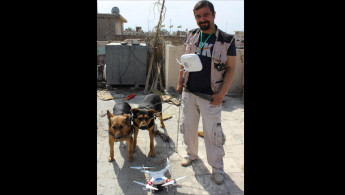Two dogs become Iraq's first 'canine reporters'
Two dogs become Iraq's first 'canine reporters'
An Iraqi photojournalist is training dogs to become 'field reporters', carrying cameras and sound equipment to hard-to-reach areas.
3 min read
Khalidi with his dogs Joe and Nancy [TNA]
One day, as he was working on a documentary on dogs, Iraqi journalist and photographer Saadallah al-Khalidi had an idea: Why not work with canines and put their skills to work in photojournalism?
Khalidi's experience in covering events in risky places, he told The New Arab, especially of clashes with Islamic State militants and the aftermath of suicide bombings, also drove his thinking. Dogs could afterall get to many hard-to-reach places that humans cannot.
Khalidi, who has some experience in breeding dogs, has worked with many agencies and media outlets, in addition to running his own production outfit. He was among the first to use drones to film reports and documentaries in Iraq.
Nancy and Joe are two dogs Khalidi has trained since they were puppies, as he said. They are very agile, smart and good at following instructions, he added, and are ready to work as canine field reporters of sorts.
"It is not easy to train dogs to become reporters," Khalidi told The New Arab. "But despite not being a professional dog trainer, some simple information helped me pull it off."
After their training, the dogs can now enter risky and hard-to-reach areas, and broadcast video live from the site.
A small camera is attached to the dog's neck or above its head, and sends video via Bluetooth to a receiver operated by humans remotely.
Any dog can be trained to do this job, and it takes intensive training for a period of one month, the Iraqi journalist said.
"Nancy and Joe carry small cameras and sound equipment that transmit orders they were trained to follow, like step forward, go backward, stop and turn back."
Khalidi compares the dogs to drones, but says they have an edge over the flying machines. "Dogs are intelligent and have a keen sense of smell and hearing...they can go to risky areas but their sense of smell can help them avoid booby traps without being in harm's way, if trained properly," Khalidi said.
The dogs can be of help in rescue situations, natural disasters and military situations too, Khalidi said.
"They can not only help cut costs and efforts, they can help save lives."
Khalidi admits there is a risk to the dogs' safety in doing this kind of work, but insists good training would help keep them safe.
"I do not deny there is a danger. But this risk is much lower compared to the risk to peoples' lives in the same line of work."
He continued: "The dog has many abilities that help it protect itself in tough situations."
Iraqis should overcome cultural sensitivity to dogs and train them at home, Khalidi said, arguing they can be instrumental in saving lives and property.
Khalidi wants to set up a canine training centre in the near future.
Khalidi's experience in covering events in risky places, he told The New Arab, especially of clashes with Islamic State militants and the aftermath of suicide bombings, also drove his thinking. Dogs could afterall get to many hard-to-reach places that humans cannot.
Khalidi, who has some experience in breeding dogs, has worked with many agencies and media outlets, in addition to running his own production outfit. He was among the first to use drones to film reports and documentaries in Iraq.
Nancy and Joe are two dogs Khalidi has trained since they were puppies, as he said. They are very agile, smart and good at following instructions, he added, and are ready to work as canine field reporters of sorts.
"It is not easy to train dogs to become reporters," Khalidi told The New Arab. "But despite not being a professional dog trainer, some simple information helped me pull it off."
After their training, the dogs can now enter risky and hard-to-reach areas, and broadcast video live from the site.
A small camera is attached to the dog's neck or above its head, and sends video via Bluetooth to a receiver operated by humans remotely.
 |
| Nancy and Joe [TNA] |
Any dog can be trained to do this job, and it takes intensive training for a period of one month, the Iraqi journalist said.
"Nancy and Joe carry small cameras and sound equipment that transmit orders they were trained to follow, like step forward, go backward, stop and turn back."
Khalidi compares the dogs to drones, but says they have an edge over the flying machines. "Dogs are intelligent and have a keen sense of smell and hearing...they can go to risky areas but their sense of smell can help them avoid booby traps without being in harm's way, if trained properly," Khalidi said.
The dogs can be of help in rescue situations, natural disasters and military situations too, Khalidi said.
"They can not only help cut costs and efforts, they can help save lives."
Khalidi admits there is a risk to the dogs' safety in doing this kind of work, but insists good training would help keep them safe.
"I do not deny there is a danger. But this risk is much lower compared to the risk to peoples' lives in the same line of work."
He continued: "The dog has many abilities that help it protect itself in tough situations."
Iraqis should overcome cultural sensitivity to dogs and train them at home, Khalidi said, arguing they can be instrumental in saving lives and property.
Khalidi wants to set up a canine training centre in the near future.



